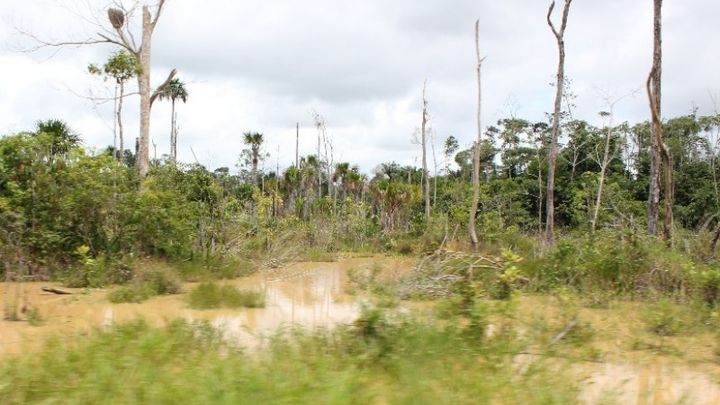
Peruvian Heartache - Doc Film
The Indigenous people are suffering all over the world. I wanted to share their story and decided to start in what I believe to be the heart of the earth... Peru, the home of the Amazon and the Andes, where remnants of one of the oldest known civilizations exists. Along with my guide, Yieber, we have visited many remote regions of this country to share the stories of the original people and help to find solutions to their daily struggles.
Tourism has exploded in Cusco, a city sitting at nearly 12,000 ft above sea level, but the money coming into the country has had both a positive and negative affect.
In a culture that has never used currency, what are the implications? How has a changing world added to the deteriorization of the traditions of these people?
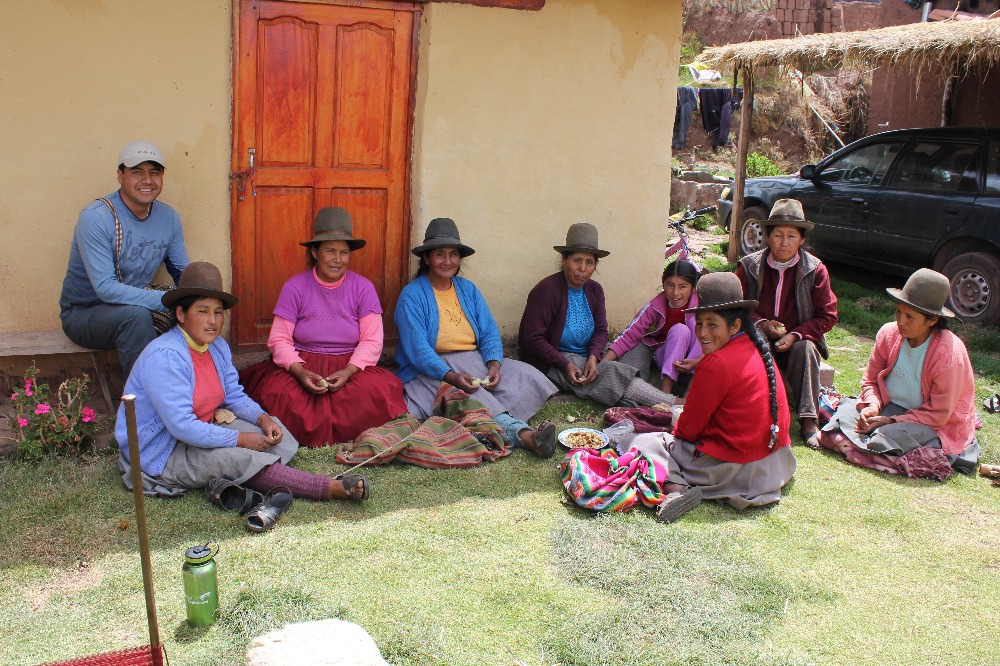 The women's weaving council in Patabamba
The women's weaving council in Patabamba
Pollution, climate change, invasion by big business, mining, logging, huge livestock factories... these are all factors which have contributed to the suffering that the indegenous must endure.
¨Money is the root of all evils¨ says Richard, a textiles weaver and porter for the Incan trail. He wants a better life for his children but also strives to preserve the traditions of his ancestors.
We are well on our way, capturing their stories, but we need your help. The more we film, the more we expose the pressing needs of these people. Adequate nutritional food, clothing, education and clean water are challenges many face daily.
You can read more about the progress of our film on our blog.
http://PeruvianHeartache.wordpress.com
Thanks for your support!
========================================
Why am I doing this? (*Updated)
In 2010 I returned to Canada after living abroad several years. I had visited many countries and witnessed firsthand how differently people lived in other parts of the world. One of the first things I noticed was how North Americans were over consuming and extremely wasteful.
Environmental Impacts of Consumption
"Calculations show that the planet has available 1.9 hectares of biologically productive land per person to supply resources and absorb wastes—yet the average person on Earth already uses 2.3 hectares worth. These “ecological footprints” range from the 9.7 hectares claimed by the average American to the 0.47 hectares used by the average Mozambican. " (World Watch Institute)
There's no shortage of land, it's strictly a distribution problem. On average Canadians discard 40% of their food. As a filmmaker I used my journalist skills to dig for information. Paper waste, carbon emissions, toxic food, global warming... Understandably overwhelmed by the facts and statistics, I felt I had to do something.
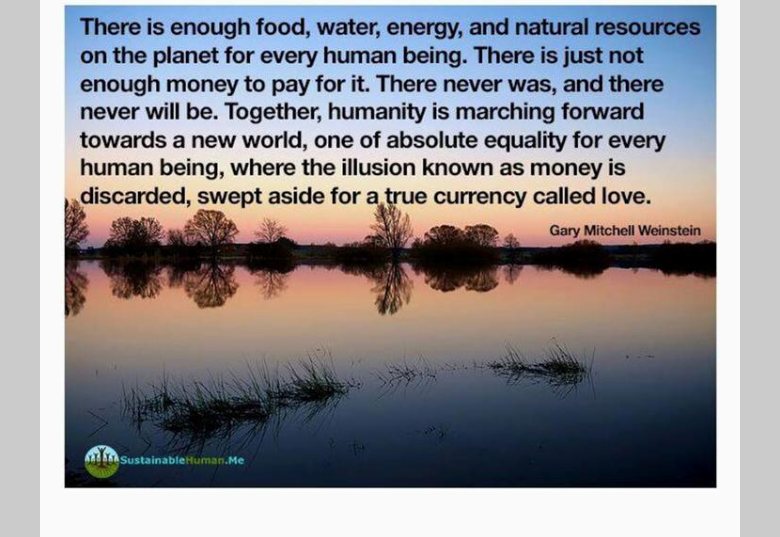 I decided to create a program to bring awareness and to teach simple ways to reduce our impact both locally and globally. My interactive transmedia experience, 30ZeroZero (30 days, Zero Waste, Zero Impact) was a great success. I adjusted my habits and reduced my waste to minimal amounts while influencing others to do the same. But after 4 years of buying local, riding transit and re-purposing goods I felt it wasn't enough. I wanted to do more. My dream is to live off-grid, build a tiny home and grow my own food, but where, when and how? I came up against so many obstacles. I realized that money was the root of problem. We live in a capitalistic society based on a failing monetary system. Occupy Wall Street pointed that out, but did protesting really change anything?
I decided to create a program to bring awareness and to teach simple ways to reduce our impact both locally and globally. My interactive transmedia experience, 30ZeroZero (30 days, Zero Waste, Zero Impact) was a great success. I adjusted my habits and reduced my waste to minimal amounts while influencing others to do the same. But after 4 years of buying local, riding transit and re-purposing goods I felt it wasn't enough. I wanted to do more. My dream is to live off-grid, build a tiny home and grow my own food, but where, when and how? I came up against so many obstacles. I realized that money was the root of problem. We live in a capitalistic society based on a failing monetary system. Occupy Wall Street pointed that out, but did protesting really change anything? 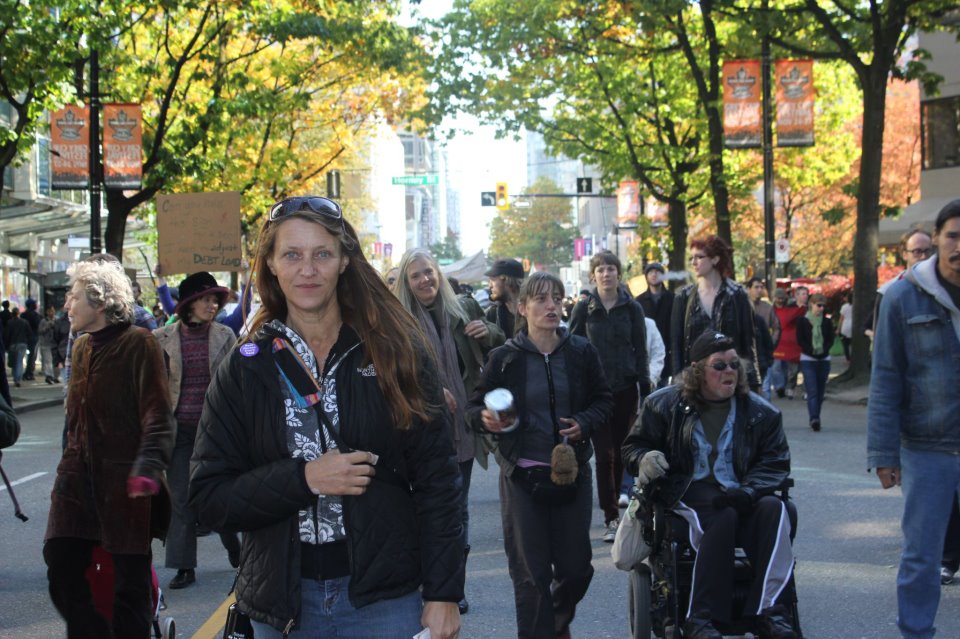 I aligned myself with scholars, scientists and activists to delve deeper, hoping to find simple solutions. Stop Reset Go, Ingienous Designs and the Institute for Future Living inspired me to use my talents as a storyteller to document how change can, and will, make a difference.
I aligned myself with scholars, scientists and activists to delve deeper, hoping to find simple solutions. Stop Reset Go, Ingienous Designs and the Institute for Future Living inspired me to use my talents as a storyteller to document how change can, and will, make a difference.
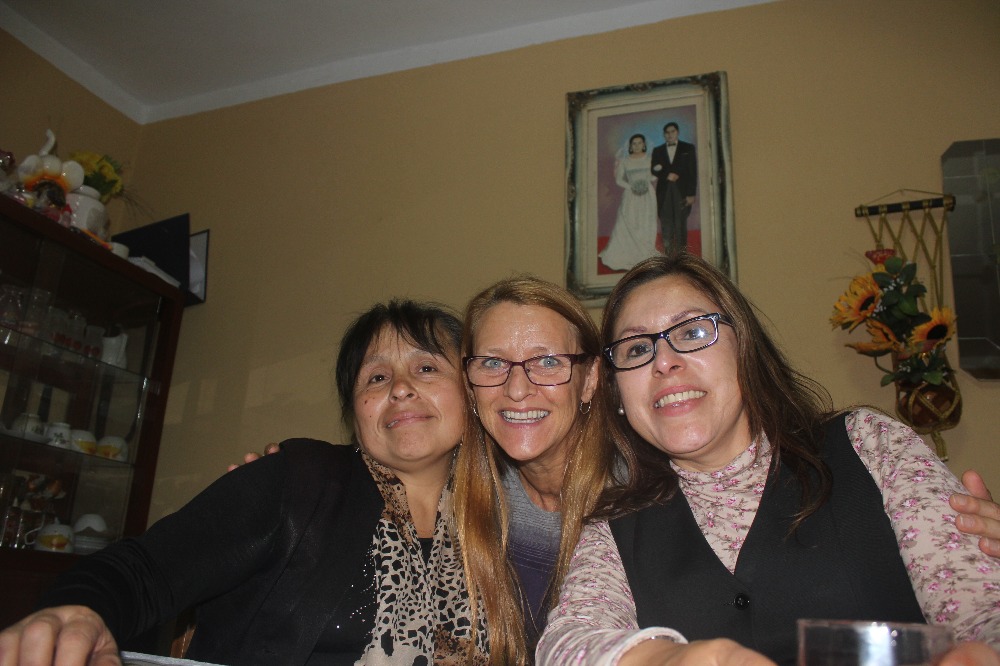 (Brigette, myself and Ines in San Martin, Lima)
(Brigette, myself and Ines in San Martin, Lima)
I am now in Cusco, where I met a fantasic couple who work as guides. Yieber and Carolina have opened their home to me and have pledged their commitment to partner with me on this important film. They run their own travel company and also have a volunteer organization to build chimneys and greenhouses high in the mountains. Adventure Heart Peru is different than other local (many foriegn owned) travel agencies as they pay their porters well and treat them as family. We have visited many remote communities and next month we will trek to ruins of the most famous ancient civilization in Peru, Machu Picchu. Unfortunately I had some problems with altitude sickness so had to take it easy for the first week here. Thank goodness that's over!
I had originally planned to begin documenting various new and established communities in South America that are striving to maintain sustainable practices, but since arriving I have seen that many of the indigenous are simply struggling for a decent lifestyle. We can learn so much from these people as they practice many techniques which are environmentally sound practices like; permaculture, off-grid communities and shared resources. They live in small hubs which can be models for the future lifestyles required for preserving both our planet and humanity.
I'm asking for your help in producing this learning tool. I'm a minimalist who´s proven I can work on a shoestring budget but there are too many costs that are stretching my savings. (also, the needs are far greater than I expected)
I humbly request that you consider sponsoring me for the past and future expenses like:
Communications - Phone & Internet connectivity
Camera Equipment - repairs to existing gear and additional items suitable for jungle and remote locations (charging batteries won't always be possible)
Transportation - I travel green and will bus/hike/ride-share when possible
Medical - Vaccinations, insurance, medications and safety supplies
Crew - Guides, translators and when necessary extra camera and audio operators.
Post Production - editing, music, graphics, voice over and additional interviews with experts
Accommodations - While for the most part I will be living out of a backpack or participating within the communities I'm documenting, I may require a safe place to rest between locations.
*Support for the Locals - Each place we visit I can feel my heart breaking. The children are so sweet and need so much. Books, school supplies, and daily lunches are needed most. We also need to pay many of our interview subjects since missing even half a day of work can vastly affect their ability to sustain themselves.
Contingencies - When traveling abroad theirs always extra expenses that pop up. Whatever is left over will be used towards marketing and distribution of the film.
If you have resources, ideas, extra airmiles or anything you think may help me realize this project I'd love to hear from you!
Thanks for your good intentions and well wishes.
Alison (aka Noni) Richards
Please share!
Tourism has exploded in Cusco, a city sitting at nearly 12,000 ft above sea level, but the money coming into the country has had both a positive and negative affect.
In a culture that has never used currency, what are the implications? How has a changing world added to the deteriorization of the traditions of these people?
 The women's weaving council in Patabamba
The women's weaving council in Patabamba Pollution, climate change, invasion by big business, mining, logging, huge livestock factories... these are all factors which have contributed to the suffering that the indegenous must endure.
¨Money is the root of all evils¨ says Richard, a textiles weaver and porter for the Incan trail. He wants a better life for his children but also strives to preserve the traditions of his ancestors.
We are well on our way, capturing their stories, but we need your help. The more we film, the more we expose the pressing needs of these people. Adequate nutritional food, clothing, education and clean water are challenges many face daily.
You can read more about the progress of our film on our blog.
http://PeruvianHeartache.wordpress.com
Thanks for your support!
========================================
Why am I doing this? (*Updated)
In 2010 I returned to Canada after living abroad several years. I had visited many countries and witnessed firsthand how differently people lived in other parts of the world. One of the first things I noticed was how North Americans were over consuming and extremely wasteful.
Environmental Impacts of Consumption
"Calculations show that the planet has available 1.9 hectares of biologically productive land per person to supply resources and absorb wastes—yet the average person on Earth already uses 2.3 hectares worth. These “ecological footprints” range from the 9.7 hectares claimed by the average American to the 0.47 hectares used by the average Mozambican. " (World Watch Institute)
There's no shortage of land, it's strictly a distribution problem. On average Canadians discard 40% of their food. As a filmmaker I used my journalist skills to dig for information. Paper waste, carbon emissions, toxic food, global warming... Understandably overwhelmed by the facts and statistics, I felt I had to do something.
 I decided to create a program to bring awareness and to teach simple ways to reduce our impact both locally and globally. My interactive transmedia experience, 30ZeroZero (30 days, Zero Waste, Zero Impact) was a great success. I adjusted my habits and reduced my waste to minimal amounts while influencing others to do the same. But after 4 years of buying local, riding transit and re-purposing goods I felt it wasn't enough. I wanted to do more. My dream is to live off-grid, build a tiny home and grow my own food, but where, when and how? I came up against so many obstacles. I realized that money was the root of problem. We live in a capitalistic society based on a failing monetary system. Occupy Wall Street pointed that out, but did protesting really change anything?
I decided to create a program to bring awareness and to teach simple ways to reduce our impact both locally and globally. My interactive transmedia experience, 30ZeroZero (30 days, Zero Waste, Zero Impact) was a great success. I adjusted my habits and reduced my waste to minimal amounts while influencing others to do the same. But after 4 years of buying local, riding transit and re-purposing goods I felt it wasn't enough. I wanted to do more. My dream is to live off-grid, build a tiny home and grow my own food, but where, when and how? I came up against so many obstacles. I realized that money was the root of problem. We live in a capitalistic society based on a failing monetary system. Occupy Wall Street pointed that out, but did protesting really change anything?  I aligned myself with scholars, scientists and activists to delve deeper, hoping to find simple solutions. Stop Reset Go, Ingienous Designs and the Institute for Future Living inspired me to use my talents as a storyteller to document how change can, and will, make a difference.
I aligned myself with scholars, scientists and activists to delve deeper, hoping to find simple solutions. Stop Reset Go, Ingienous Designs and the Institute for Future Living inspired me to use my talents as a storyteller to document how change can, and will, make a difference.
*On October 13th, 2015 my journey began with 9 days on the coast of Peru, in the biggest and capital city, Lima. I was hosted by a wonderful and generous family who lived in a modest neighborhood just outside the city. It gave me an opportunity to adjust to the different culture and practice my limited spanish. They were sad to see me go, but I promised to return and spend time with them when before I left the country.
 (Brigette, myself and Ines in San Martin, Lima)
(Brigette, myself and Ines in San Martin, Lima)I am now in Cusco, where I met a fantasic couple who work as guides. Yieber and Carolina have opened their home to me and have pledged their commitment to partner with me on this important film. They run their own travel company and also have a volunteer organization to build chimneys and greenhouses high in the mountains. Adventure Heart Peru is different than other local (many foriegn owned) travel agencies as they pay their porters well and treat them as family. We have visited many remote communities and next month we will trek to ruins of the most famous ancient civilization in Peru, Machu Picchu. Unfortunately I had some problems with altitude sickness so had to take it easy for the first week here. Thank goodness that's over!
I had originally planned to begin documenting various new and established communities in South America that are striving to maintain sustainable practices, but since arriving I have seen that many of the indigenous are simply struggling for a decent lifestyle. We can learn so much from these people as they practice many techniques which are environmentally sound practices like; permaculture, off-grid communities and shared resources. They live in small hubs which can be models for the future lifestyles required for preserving both our planet and humanity.
I'm asking for your help in producing this learning tool. I'm a minimalist who´s proven I can work on a shoestring budget but there are too many costs that are stretching my savings. (also, the needs are far greater than I expected)
I humbly request that you consider sponsoring me for the past and future expenses like:
Communications - Phone & Internet connectivity
Camera Equipment - repairs to existing gear and additional items suitable for jungle and remote locations (charging batteries won't always be possible)
Transportation - I travel green and will bus/hike/ride-share when possible
Medical - Vaccinations, insurance, medications and safety supplies
Crew - Guides, translators and when necessary extra camera and audio operators.
Post Production - editing, music, graphics, voice over and additional interviews with experts
Accommodations - While for the most part I will be living out of a backpack or participating within the communities I'm documenting, I may require a safe place to rest between locations.
*Support for the Locals - Each place we visit I can feel my heart breaking. The children are so sweet and need so much. Books, school supplies, and daily lunches are needed most. We also need to pay many of our interview subjects since missing even half a day of work can vastly affect their ability to sustain themselves.
Contingencies - When traveling abroad theirs always extra expenses that pop up. Whatever is left over will be used towards marketing and distribution of the film.
If you have resources, ideas, extra airmiles or anything you think may help me realize this project I'd love to hear from you!
Thanks for your good intentions and well wishes.
Alison (aka Noni) Richards
Please share!
Organizer
Alison Richards
Organizer
Coquitlam, BC